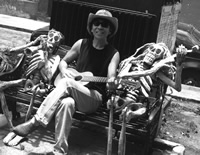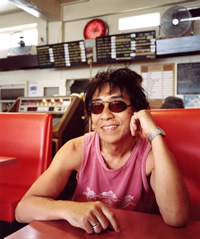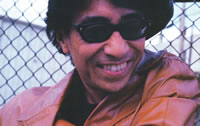BLUE ASIA
From fRoots October 2006
By Paul Fisher
 Makoto Kubota is not your typical Japanese stereotype. He's late for starters, just as he was the first time we met for an interview for fRoots twelve years ago. He describes himself as an aging hippy and talks about 'jah-guidance'. Makoto Kubota though is no flaky individual. For the past thirty years or so, he's been one of Japan's greatest musical pioneers, as if on a personal crusade to combine Asian and other disparate rhythms and styles from around the world to create his own trademark Kubota sound. One word keeps recurring when talking about and talking to Kubota; 'champloo' (in Okinawan) or 'champur' (in Indonesian) meaning mixture. His now classic second album from 1975 with his group the Sunset Gang was called 'Hawaii Champloo', and was the first time many Japanese had heard Okinawan music, and certainly the first time Okinawan music had been mixed with Hawaiian music.
Makoto Kubota is not your typical Japanese stereotype. He's late for starters, just as he was the first time we met for an interview for fRoots twelve years ago. He describes himself as an aging hippy and talks about 'jah-guidance'. Makoto Kubota though is no flaky individual. For the past thirty years or so, he's been one of Japan's greatest musical pioneers, as if on a personal crusade to combine Asian and other disparate rhythms and styles from around the world to create his own trademark Kubota sound. One word keeps recurring when talking about and talking to Kubota; 'champloo' (in Okinawan) or 'champur' (in Indonesian) meaning mixture. His now classic second album from 1975 with his group the Sunset Gang was called 'Hawaii Champloo', and was the first time many Japanese had heard Okinawan music, and certainly the first time Okinawan music had been mixed with Hawaiian music.
Thirty one years later and Kubota is still mixing the sounds, probably now with more success than ever with his latest group, Blue Asia. Blue Asia have become a bit of a word of mouth phenomenon, being championed by Charlie Gillett in the UK and having successive albums in the World Music Charts Europe. Kubota and his fellow Blue Asians, Japanese Yoichi Ikeda and Malaysian arrangers and top session players Mac Chew and Jenny Chin, have traveled to various locations to record local musicians on a series of 'Hotel' albums. So far, Hotel Ibah (Bali), Waimea (Hawaii), Istanbul, Vietnam, Bangkok, and most recently, Morocco. Recordings from those sessions are then brought back to where I'm sitting with Kubota, his own studio on the first floor of his house near Yokohama. Decks of equipment are laid out in front of us, computers, a mixing desk and most proudly of all for Kubota (who I suspect could talk happily about this for next couple of hours if I let him) his analogue 'vintage gear' made by Telefunken and Rupert Neve. Instead I steer our conversation in the direction of Blue Asia.
"We started Blue Asia about five or six years now. There was a time that Chill Out music was introduced to Japan so I thought in my typical Makoto style, I would try to do my own version. I know Asia very well so I mixed this chill out downbeat thing with gamelan and some Indonesian singing and this is the first album Hotel Ibah. It's an actual hotel in Ubud, Bali, you have to go and visit sometime, it's the world's best hotel, expensive but not extravagant."
 Indeed each album features photos of a real hotel, and usually it seems quite luxurious. On a visit to Istanbul, where the second album was recorded I made an enquiry into the Blue Asia featured Hotel in Istanbul but found out it was about five times my budget. "After Bali I went to Istanbul and recorded lots of street music in Istanbul and Cairo too, but I named the album Istanbul." I wondered how he went about finding the musicians to record. "Pure coincidence, it's like jah guidance, I just follow my instinct. I walk on the streets and I find the musicians most of the time. I'm exaggerating a bit though, sometimes I use coordinators to get information."
Indeed each album features photos of a real hotel, and usually it seems quite luxurious. On a visit to Istanbul, where the second album was recorded I made an enquiry into the Blue Asia featured Hotel in Istanbul but found out it was about five times my budget. "After Bali I went to Istanbul and recorded lots of street music in Istanbul and Cairo too, but I named the album Istanbul." I wondered how he went about finding the musicians to record. "Pure coincidence, it's like jah guidance, I just follow my instinct. I walk on the streets and I find the musicians most of the time. I'm exaggerating a bit though, sometimes I use coordinators to get information."
One singer featured on Hotel Bangkok called Lady Nan, has particularly been singled out in reviews for her exquisite voice. How did he find her? "After a session or a meeting I was walking on the street trying to find some decent food in a kind of semi red light district in Bangkok. I started hearing this lovely voice with a typical lukthung (Thai country) background and I found this little lady sat on the street, singing with this portable karaoke machine. It sounded so good. She used a little microphone and a guitar pedal with echo and she mixed it all perfectly using the street ambience. At this moment I was so intoxicated I couldn't move for thirty minutes and started filming and taping her. She was blind, a professional street singer. I tried to talk to her but she was too busy and I couldn't speak Thai so I had to stop some girl in the street and pay her some money to help me get some information and managed to get her name and a contact number. Her husband is also blind and they communicate by cell phone, modern hi-tech street people, but the number was slightly wrong so it was difficult to contact her, but eventually I managed to persuade her to come to the studio."
Then how did he decide what she was going to sing? "She had this ready made karaoke tape of popular lukthung folk songs, so I asked her to bring the same thing to the studio and sing to it and I recorded separately a backing track and her voice. Take 1, take 2 that's about it. That's my typical routine, let them do what they feel right and comfortable with, and after that I dump everything to my hard disk, pro-tools, and start editing and making different music so probably she got surprised to hear the final product! I don't know where she is now. I want to see her singing at Nakano Sun Plaza or Royal Albert Hall, playing with the band, Blue Asia, that's what I want to see."
And does he look for instrumentalists in the same way? "Yes, same thing, some session guys or night club if I see a good player I go and talk to the guy, tell him to come to the studio or my hotel room and start recording. These days you can do so much with a Powerbook and Roland R4, the cream of technology. Then I create the music in my studio, in this humble suburban home some hi-tech, low tech and vintage equipment, like the Neve, and Telefunken.
 Like many a Western musician working with 'world' music, Makoto Kubota is endlessly interested in other people's musical roots, but what about his own? "I was born in the generation after the war and we tend not to think about our own roots too much. There was a big invasion of jazz, rock 'n' roll and western music so I guess we've been too busy absorbing all the influences from outside but of course we feel hunger about our roots and we want to feel more comfortable. I guess that's what we have been doing, searching for the new us- the new Japan. Hotel Vietnam is the closest thing to Japan so far in my own experience."
Like many a Western musician working with 'world' music, Makoto Kubota is endlessly interested in other people's musical roots, but what about his own? "I was born in the generation after the war and we tend not to think about our own roots too much. There was a big invasion of jazz, rock 'n' roll and western music so I guess we've been too busy absorbing all the influences from outside but of course we feel hunger about our roots and we want to feel more comfortable. I guess that's what we have been doing, searching for the new us- the new Japan. Hotel Vietnam is the closest thing to Japan so far in my own experience."
Did he feel there was a musical connection between Japan and Vietnam? "Definitely. When I went to Ho Chi Minh I went to an old instrument shop and I found instruments that looked exactly like the shamisen, the Japanese traditional instrument used in kabuki. In sound too, the groove, the way they play, more so in Vietnam than Thailand or Indonesia. That was amazing, and kind of shocking and it's far from Western or the Indian/Arabic root, which is more mathematical in a music sense. The sense of timing is more irregular like Japanese music so it was difficult to mix with my music which is mostly rock n roll and jazz but it was fun, a difficult job but fun."
And where did he think this connection between Japan and Vietnam came from? "Before isolation time before the Edo era there was a big Japan town in Hoi An. We exchanged products, technology and humans too. We tend not to talk about it, but I'm sure this is the root of kabuki music. That's another reason why the origin of kabuki is secretive. Their society was low caste historically, now it's like a cultural treasure, but when they started we called them 'people from the river field' without their own house, outcasts. Probably part of the reason for this is kabuki came from a foreign root. It could have been China or Korea but I feel very strongly it was from this Vietnam connection. My grandmother was a professional geisha, another reason I feel so strongly about the connection between Japan and Vietnam. When I heard their local three stringed instrument it was exactly the same as I heard from my grandmother. That's my only Japanese root but at that time I was listening to Hank Williams on the record player."
With his group Yuyake Gakudan, (Sunset Gang) Kubota played at first rock music but soon started mixing in various roots elements beginning with Okinawa. On an early album they recorded a version of Shokichi Kina's Haisai Ojisan, which has subsequently become an Okinawan standard, with Hawaiian elements. Along with his friend and collaborator Haruomi Hosono they were among the first to start combining disparate music styles. What was his early inspiration for mixing various musical styles "Well if the Incredible String Band mixed this and that then I thought maybe I can do the same. I highly respect them because they're original Celtic people mixing with Oriental and Medieval European music To me they're more important than most British rock 'n' roll, they're something special."
During the 1980s it was the music of East Asia that would come to dominate his own music and production. "I was a tourist, went to Bali and got excited about the music I heard. Gamelan, kendang their rhythm and beat so I thought about mixing these elements with my music. At that time in England it was very interesting because I could feel some kind of feeling for expression. After punk or new wave you could do anything for a few years. It didn't matter if you were old or young, if you're unique, you're good, then you're in. so I thought it was a good time for me to start introducing all these Asian elements to the world. I guess it worked a little. Not to the public so much but to musicians like David Sylvian or David Bowie who came to us and said you're great, and set up tours in England, Europe and Australia and for a while it was a fun time."
Another constant in Kubota's life is the music of Hawaii. From recording with Ry Cooder on the Shokichi Kina album 'Bloodline' to various solo projects and the Blue Asia album, Hotel Waimea. Where did his fascination with Hawaii came from?
"Hawaii is a special place for us Japanese and for me too. It's an island in the Pacific with a special energy and historically the Japanese have had a lot to do with them. Okinawans and Japanese, we are part of Hawaii. It has the best weather and beaches, so it's a typical tourist attraction too, but strangely Hawaiian people have a strong music culture and performance quality. Also the place has a lot of rock n roll, Americans and coca cola, a land of mixture, my favorite type of place. When I first went to Hawaii in the early 70s I found some interesting points. There were a lot of Asian influences which I had never expected. All the Chinese immigrants, and Japanese, first and second generations were still there. All the Japanese immigrants have a lot of heritage from before the war. it was so interesting so I decided to mix a few things together, the Okinawan and Hawaiian experiences.
His most recent trip for Blue Asia has been to somewhere totally different and a little unexpected; Morocco. "This is as far as we go, Morocco is not part of Asia but racially the local people have a strong relationship with us, I feel that racially and musically too. Again it's a mixture land of ancient diaspora culture with Afro old Ghana empire and Arabic.
Once again he found musicians playing on the street. "Even before I went to Morocco I was aware of this music called gnawa which is a kind of religious, magical, or trance music. It is similar to rock n roll, they play a stringed instrument called gemburi but it looks likes Bo Diddley's guitar; square shaped and very funky. They also use qarqab, these metal castanets and play some kind of samba groove, very very similar to Brazilian samba. It has a good intonation and syncopation and they sing like a rock n roll star. But actually it works, it functions, as a real trance magical, ritual music. When you go to the ceremonies all the ladies get into a serious trance like candomble, like voodoo it's fantastic. It's a casual culture, its nothing special they've been living with it for hundreds of years but these past few years it reached the rock 'n' roll stage. They play in a stadium using a huge PA system and this gemburi sounds like Robbie Shakespeare bass lines with qarqab playing a harsh rock 'n' roll samba groove and its fantastic. So I thought it was a good time for me to go there and visit all the maestros and jam with them.
And in his champloo style Kubota added Brazilian sounds from his latest obsession, musica nordestina, from northeastern Brazil. "It's not an unreasonable thing, because this town which is at the centre of gnawa music is called Essaouira. It's a famous rock 'n' roll legendary place where Jimi Hendrix stayed for a while and wrote a couple of famous songs like Castle Made of Sand. This place used to be Portuguese territory so I'm sure during the slave trade time or Colombus in the 17th and 18th centuries, there was a big connection between this town and Cape Verde and northern Brazil. They look close too, the people look similar and the music, accent and beat and they should get married soon so I was there to be the middle man."
On most Blue Asia albums are dub mixes of various tracks. I wondered if his production technique is influenced by Jamaican dub pioneers such as Lee Perry or King Tubby. "Yes, they're the big innovators sonically, as well as American rock n roll, Atlantic and Motown. I was too young to go there and learn the techniques but I was there to work with Jamaican musicians in the late 80s and I worked with many Jamaican engineers. That was you could say my school for engineering, production, making the most using the least. Very very minimal instruments and get the juice from it. That' s their style the Jamaican people who learned to make the world's strongest music. Jah guidance."
My visit to Japan had coincided not only with the release of Hotel Morocco but also his first world music book, a compilation of his Asian recordings called Alchemist Diary and his compilation to accompany Hotel Morocco, Arabic Cafe. All the publicity I had read starts off by describing him as a 'world music pioneer'. Is that how Kubota sees himself? "No I'm a music man, I like Miles Davis as well as Elvy Sukaesih. I don't say good or bad, but favorite music and regular music. I'm not a world music producer but a producer, I'm even thinking of producing enka (Japanese sentimental country) music. I haven't done enough research but probably I'll do that in the next few years. Champloo enka with a Brazilian beat!. He gives a wry smile. "Well, maybe not.. I don't think so…not yet!"